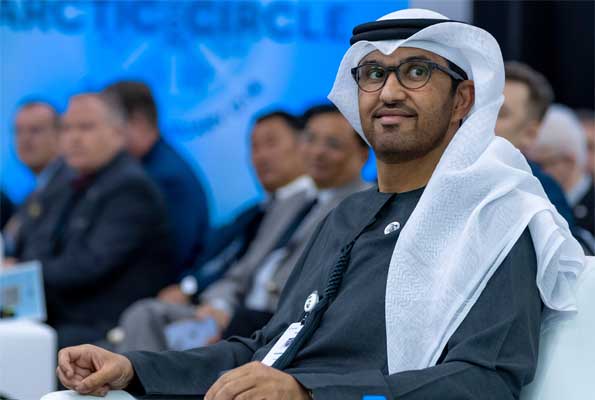The recent letter from COP28 head Sultan Al-Jaber shows what would be discussed in Dubai. There are probably way too many to resolve them all.
COP28 may introduce global renewable energy targets or foreign exchange risk guarantee mechanisms. Long-standing concerns like fossil fuel phasedowns or MDB funding increases are less likely to be resolved.
The G20, United Nations General Assembly, and United States-China discussions that precede COP28 will show how far away countries are and what compromises are conceivable.
The COP28 agenda is shaping up. COP28 head Sultan Al-Jaber wrote a letter in July 2023 describing the main areas of work.
The letter also notes that South Africa’s and Denmark’s Environment Ministers will lead Global Stocktake consultations. The GST shows countries where they are making progress toward Paris Agreement goals and where they are not.
Al-Jaber’s decision to transfer part of his tasks to South Africa’s and Denmark’s ministers may be an attempt to defuse issues over his leadership and the oil industry’s influence on climate talks.
Energy
The document outlines six new energy transition deliverables.
First, COP28 will explore tripling renewable energy capacity and doubling energy efficiency improvements across sectors by 2030, including electrification and cooling.
Then, COP28 will discuss more than halving oil and gas industry scope 1 and 2 emissions, including near-zero methane emissions by 2030.
After that, COP28 will discuss scaling up low-carbon hydrogen, CCS, and carbon dioxide removal in heavy-emitting sectors.
COP28 will also address transport system decarbonization through vehicle electrification and modal shifts.
Later, COP28 will increase efforts to reduce coal power, fossil fuel subsidies, coal-related methane emissions, and clean baseload capacity.
Finally, COP28 will debate how corporations and countries should disclose to maintain accountability, following best practices and global norms.
COP28’s six energy deliverables satisfy distinct constituencies. A global renewable energy and energy efficiency objective will please the European Union, which demands it.
Fossil fuel-producing nations will welcome CCS and the lack of a concrete fossil fuel phasedown commitment. The COP28 debate is unlikely to resolve it.
Finance
Finance will dominate climate diplomacy in 2023, as shown in the Paris Summit for a New Global Financing Pact.
Al-Jaber’s letter acknowledges this and sets three COP28 goals. Multilateral development banks (MDBs) must release more funds for developing countries’ climate action. The letter invites MDB shareholders to support the 2022 G20 Capital Adequacy Review to increase public finance.
Second, MDBs must innovate to increase private capital flows for the net zero transition. One answer is stronger foreign exchange risk guarantee procedures.
Third, to expedite financial progress, the letter recommends reforming and harmonizing regulatory frameworks (including transition finance definitions and climate-related data disclosure) and unlocking voluntary carbon markets.
Some calls may fail. For instance, the US government has opposed a World Bank capital increase in the foreseeable future. The letter does not discuss other ways to raise cash, such as a global shipping tax or an oil import tax, but these may be debated at COP28.
The harmonization of regulatory systems continues. In June 2023, the International Sustainability Standards Board (ISSB) released its first two global sustainability disclosure standards on general sustainability and climate change. The criteria would begin in 2024, with the first report scheduled for 2025.
Adaptation, Loss, & Harm
Climate adaptation, loss, and damage progress are also stressed in the letter. Because developed countries regard them less, climate diplomacy generally ignores these two issues.
The net loss and damage fund and its funding arrangements from COP27 in Sharm-El-Sheikh in 2022 will be the main goals of COP28.
The letter also suggests that COP28 might establish a thorough Global Goal on Adaptation framework. This target must match the 1.5°C mitigation goal.
As in prior COPs, adaptation loss and damage will be the toughest to discuss. For instance, US Climate Envoy John Kerry has stated that his country rejects ‘climate reparations’ for climate-affected nations.
The fund’s operational schedule in the letter is equally ambitious. Most likely, COP28 will only examine the fund’s governance framework and agree on funding later.
What’s Next?
In the next few months, several meetings will prepare for COP28. At the end of July 2023, the G20 Environment and Energy Minister Meeting in India failed to make any headway on the topics mentioned. The G20 Leaders’ Summit in September will restart the discussion.
In late September, international leaders will assemble in New York for the UN General Assembly. The first GST’s final report will reveal how far we are from fulfilling Paris Agreement goals at the same time.
John Kerry’s China visit advanced climate diplomacy. Despite no breakthroughs, both sides agreed to resume climate meetings. After House Speaker Nancy Pelosi visited Taiwan last year, US-China climate negotiations were halted.
Conclusion
COP28’s priorities are to satisfy as many countries as possible. Developed countries may have to abandon fossil fuel phasedowns to reach a global renewable objective. Innovative ideas like foreign exchange risk guarantees could help rich countries reduce their climate finance payments.



